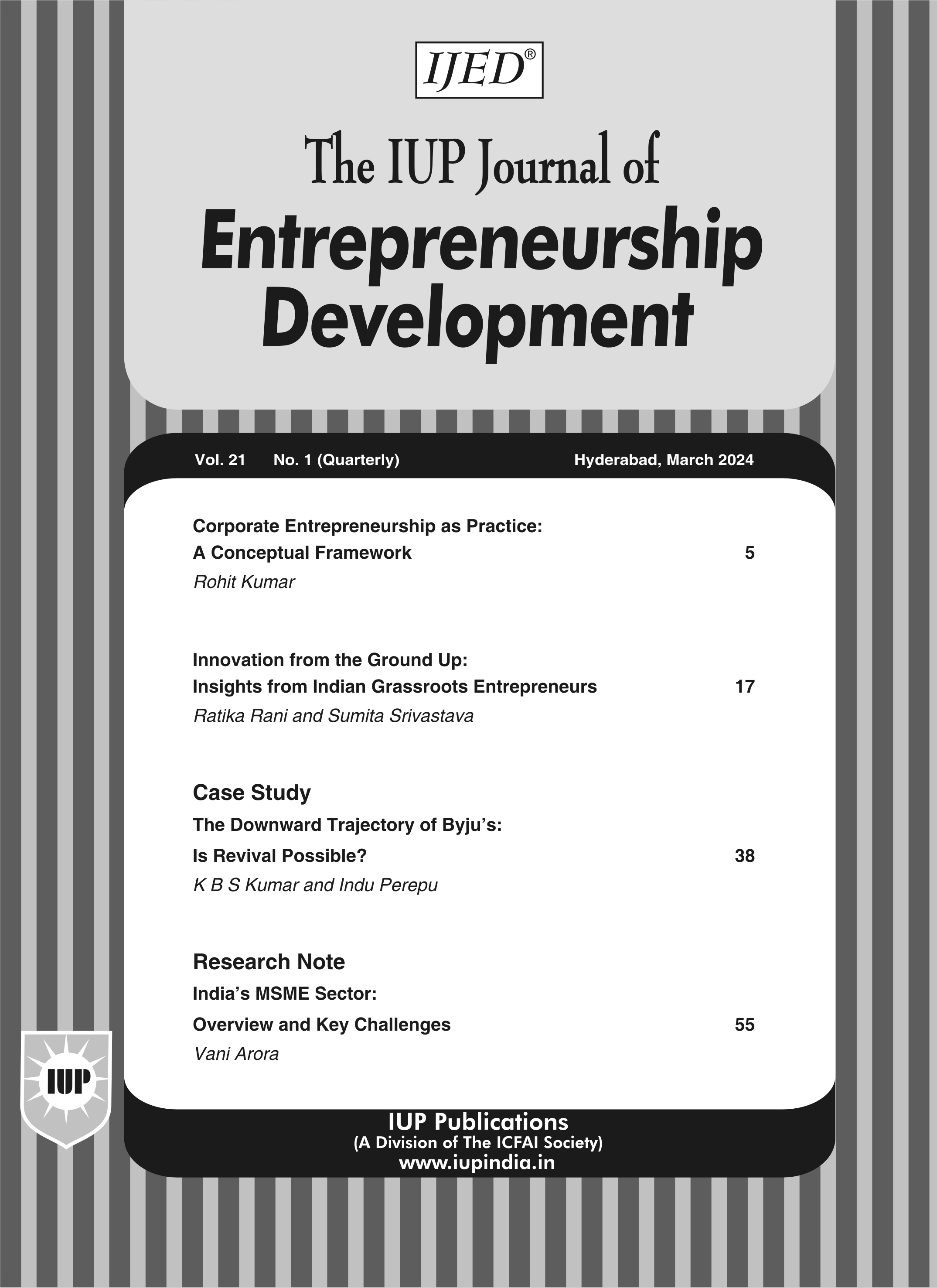
Dec'22
The IUP Journal of Entrepreneurship Development
Archives
Role of KSUM to Stimulate Entrepreneurship in Kerala
Shameera M K
Assistant Professor, Department of Commerce, MES Kalladi College, Mannarkkad, Kerala, India; and is the corresponding author. E-mail: shameera@meskc.ac.in
D Vennila
Assistant Professor, Center for Women Studies & Research, University of Kashmir, Srinagar, Kashmir, India. E-mail : Roshanara66@gmail.com
Startups have a significant impact on India's economy. People with innovative ideas are setting up startups with minimal resources. While skills are key to creating successful startups, innovation is a prerequisite for the development of any nation. To promote entrepreneurship, the Government of Kerala has launched different schemes for young entrepreneurs in the state. This paper mainly covers the schemes available under the Kerala Startup Mission for young and innovative entrepreneurs and information relating to startups in the state.
Introduction
India has been known for its Information and Communications Technology (ICT) capabilities for decades and more recently for its speed. Economic development through digital transformation and innovation has been taking place in India. The recent rapid economic development has made India the largest startup-friendly county in the world. India's startup ecosystem is constantly evolving, and the past few years have seen an increase in the number of angel investors, Venture Capital (VC) funds, and incubators. Accelerators and support from government initiatives such as Digital India, Startup India, and smart cities have given momentum to setting up of startups and investment activities in every sector. The number of unicorns, rapidly increasing purchasing power, mobile Internet usage, new Internet access, hypermarkets, social media adoption, innovation, cheap prices, and favorable consumer demographics lead to growth in startup investment now. The Kerala government has been providing various support facilities for startups.
Entrepreneurs are the backbone of any country's economic development and are important initiators for setting up of new enterprises. The ultimate results of these activities are balanced growth in regional development, effective distribution of resources and active involvement in the country's economic development. Entrepreneurship has been adopted worldwide as a measure to inculcate economic involvement in young people.
Kerala Startup Mission (KSUM) is a nodal agency under the Government of Kerala for promoting startups since 2015. KSUM is helping the state to develop new startups with viable and scalable products and offering to problem-specific solutions to various societal problems. KSUM has unveiled a number of programs that focus on the entire lifecycle of startups. KSUM has multiple incubators, accelerators, and innovation zones across the state. KSUM also supports a number of incubators such as Maker Village, Bionest, Digital Hub, and Research Innovation Network Kerala (RINK).
A startup is a venture founded by two or more entrepreneurs with a focus on innovation. This agility fosters the creation of thousands of startups around the world annually. Software startups are startups that build software-intensive products/services. New software ventures such as Google, Amazon, eBay, and Uber have entered into successful startups. Over the years, the Government of Kerala has taken various measures to create a vibrant startup ecosystem in the state primarily to foster the growth of innovation-led technology entrepreneurship. KSUM covers every point of the startup, starting from capacity development, infrastructure development, funding, and industry association through incubation centers in Kerala. Common among them are infrastructural support, venture capital financing, mentoring support, and marketing to startups in the state. The success of every startup depends on the effectiveness of incubation services received from these centers.
In Indian Context
India, as a developing economy, is facing the problem of job scarcity. Entrepreneurship provides a great opportunity for members of the society, economy, and overall development of the country. There are tremendous opportunities for startup entrepreneurs in India, especially in sectors like information technology, healthcare, biotech, energy, waste management, etc. Moreover, the Indian government has launched various schemes like Startup India and Standup India in order to support the young innovators in the country.
In Kerala Context
The Government of Kerala has been taking necessary steps to provide adequate help and support in terms of infrastructure and finance to young entrepreneurs in the state by setting up Technology Business Incubators (TBI). Now TBI has been renamed Kerala Startup Mission. As a nodal agency, its key role is to conduct programs and policies for the state under the Government of Kerala. KSUM seeks to encourage idea generation and innovation to enhance entrepreneurial behavior among students. Kerala government supports a number of schemes for different startups in Kerala through its beneficiaries. KSUM has a number of beneficiaries through which most funds are disbursed to startups.
Literature Review
Deepthi (2020) described how employee engagement affects the productivity of startups in Bengaluru city. Determinants of employee engagement like training, job satisfaction, compensation, empowerment and leadership will have a positive impact on productivity. A majority of employees agreed that their company was providing health and safety measures at the workplace. The study also found that a job in a startup is challenging and it allows employees to utilize their skills, knowledge, and ability. Startups in IT services, healthcare and life sciences are providing high compensation to employees.
Moondra (2020) also made a cross-country analysis of incubation ecosystem in India, USA and Canada. He compared these three countries in terms of incubator facilities, cross-cultural impact on society and overall entrepreneurship.
Trivedi (2020) also measured the success of incubation centres in India with parameters like 'shared services, physical infrastructure, mentoring and networking activities, host institution support, stakeholder support, entry and exit criteria, performance checking mechanism, and funding'.
Sabrina Korreck (2019) found that the Indian market offers many opportunities for startups and startups carry great hope to promote growth and development and also employment opportunities. The study found that there are many opportunities for startups in India due to the continuous growth in the economy, and thereby income and purchasing power of people is also increasing. This study also focused on growth drivers and challenges faced by Indian startups. The study also found that non-tech, social and microentrepreneurs have come up with innovative ideas and solutions. The study focused on the current state of the Indian startup ecosystem and concluded that it has focused on three major goals: understanding growth-driven factors and motivation of Indian startup founders; identifying the challenges faced by startups; and outlining the pillars that support startups. The study stressed finance for startups and bridging the gap from identification stage to next stage of startups. Startup ecosystem actors expect the intervention of government authorities with regard to providing incentives, angel investment and seed capital assistance.
Gopaldas (2018) opined that time, teamwork, and tenacity are the important elements that determine entrepreneurial success. The study found that infrastructure, government regulations, and availability of finance at various stages of growth, revenue generation, and good branding strategies are successful factors for startups. The study concluded that in India startups have a number of opportunities like huge population and huge investment from foreign and Indian investors. Make-in-India initiatives and other government schemes have also given a boost to startups.
Literature shows that a vibrant startup ecosystem consisting of funds and skills is essential for promoting and nurturing startups in every state. In Kerala, the government has a vibrant and active ecosystem consisting of incubators, mentors, accelerators, venture capitalists, and angel investors. In this context, it is important to study the role of KSUM in promoting startups in Kerala and to evaluate the performance of startups registered under it.
Objectives
- To understand the schemes offered by KSUM for promoting startups in Kerala.
- To evaluate the performance of startups under KSUM.
Methodology
The study uses qualitative research and secondary data for analysis. The data was collected from the KSUM report, for the period between 2017 and 2022 and also from the startup handbook and the websites of the KSUM. Tables and figures are used to interpret the data.
Key Plans and Schemes
KSUM focused on encouraging startups in the state by launching incubators in major districts. These are envisioned as the powerhouses of the state's startup ecosystem, which will bring out potential technological innovations, talent pool, employment, IPs, external investments, and industrial ecosystem, and ultimately contribute to the GDP growth of the country. Technology business incubators are located in Thiruvananthapuram, Kochi, Kozhikode, and Kasaragod in Kerala state. The startup ecosystem is illustrated in Figure 1.
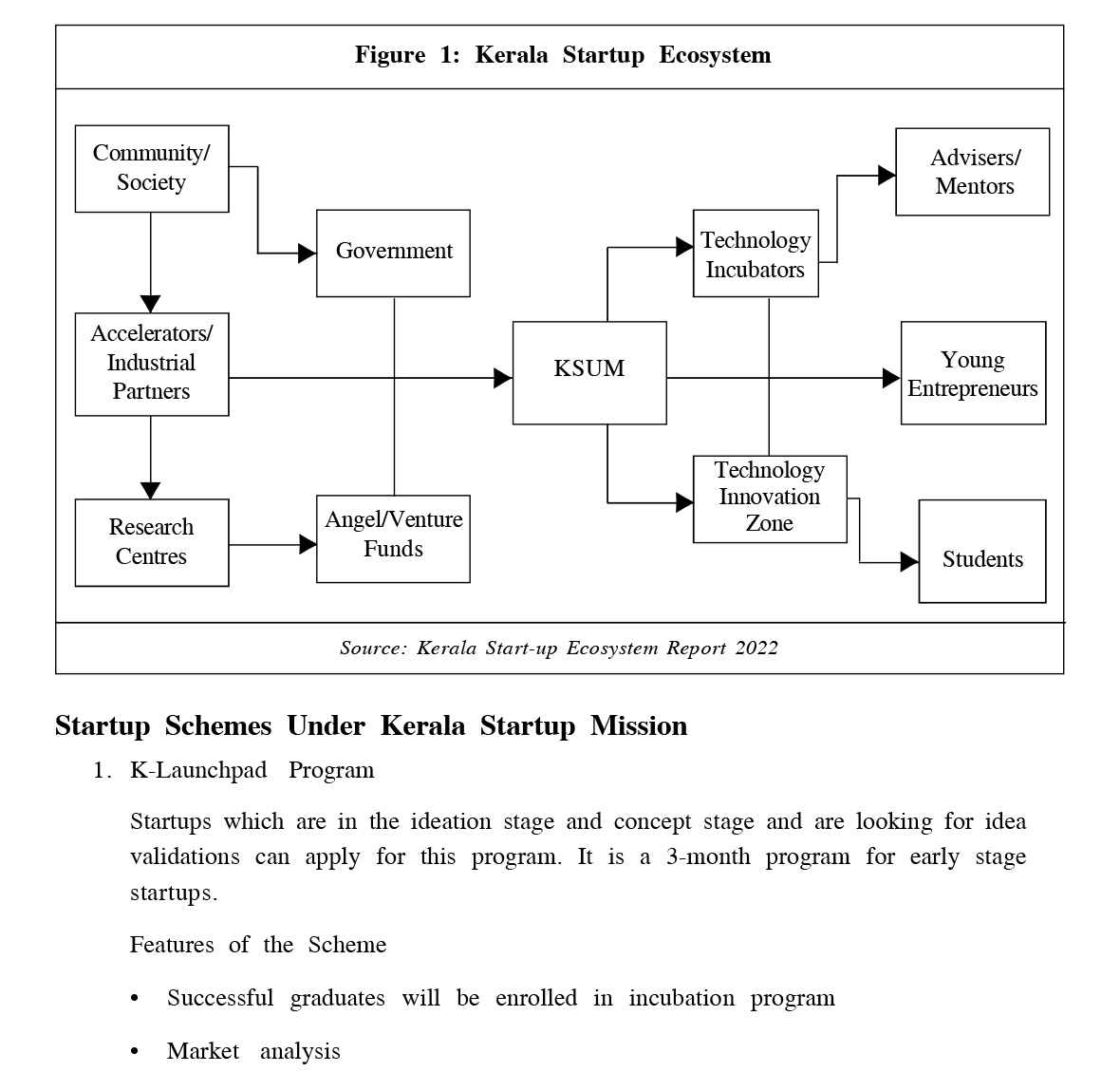
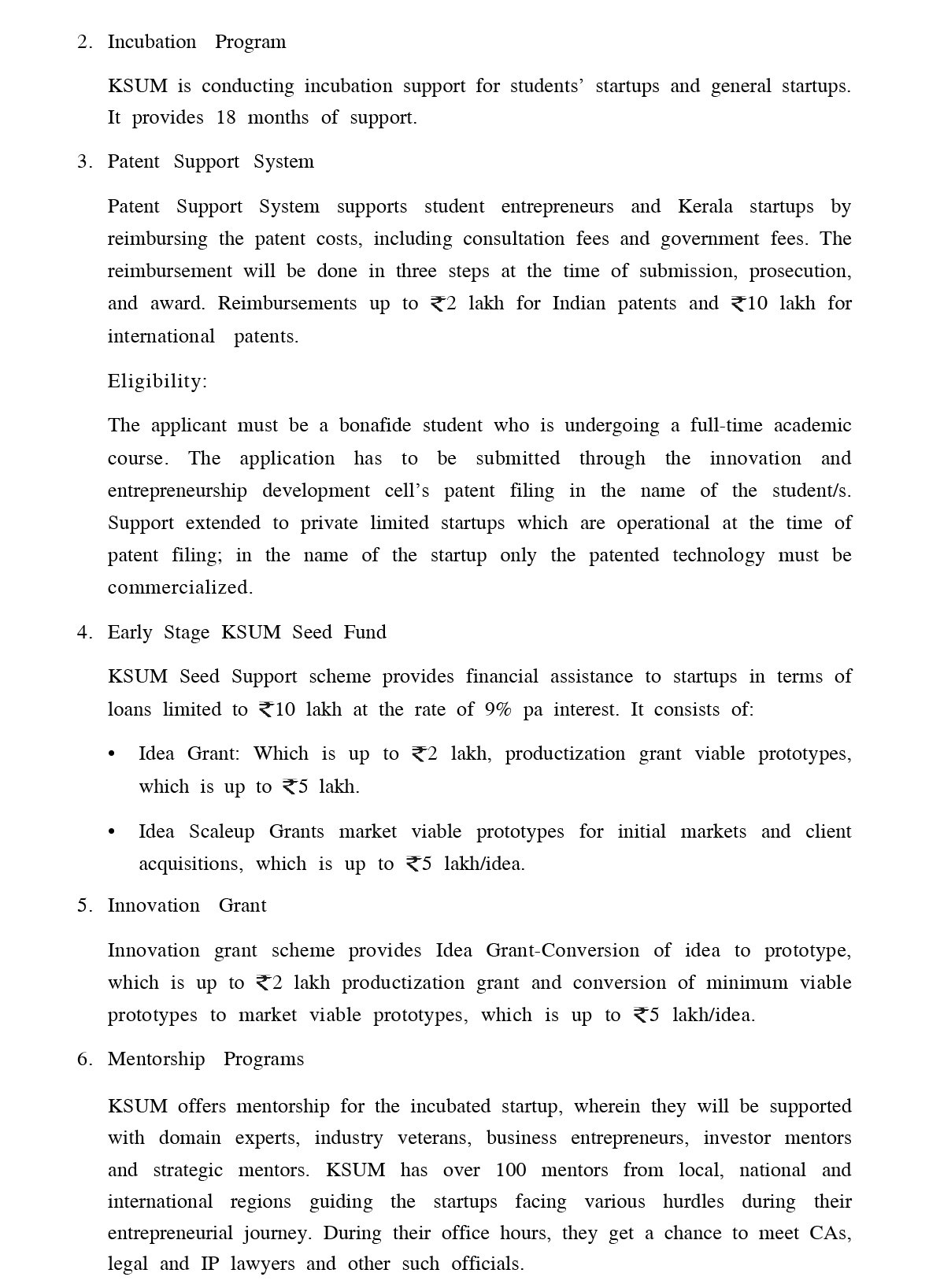
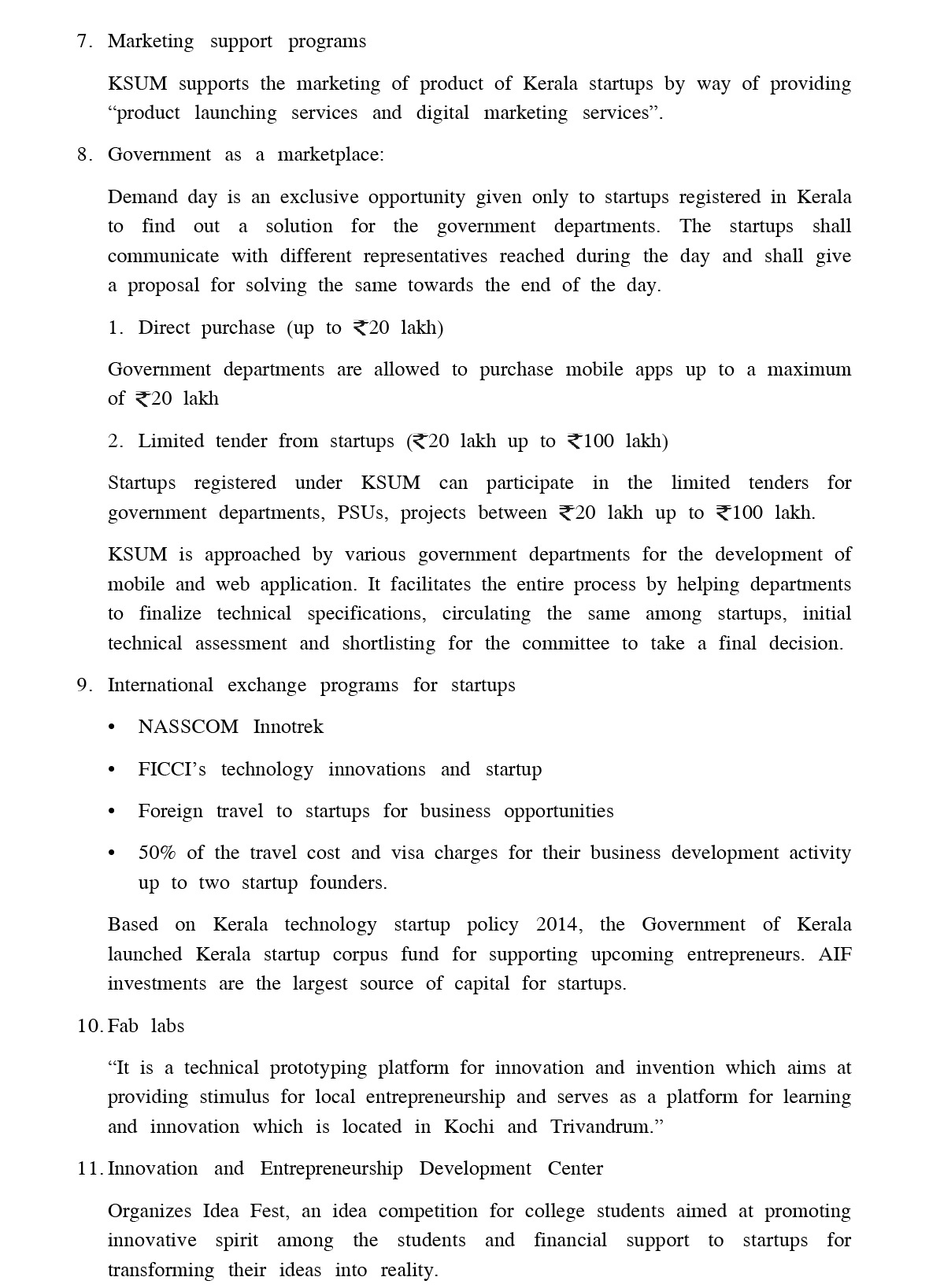
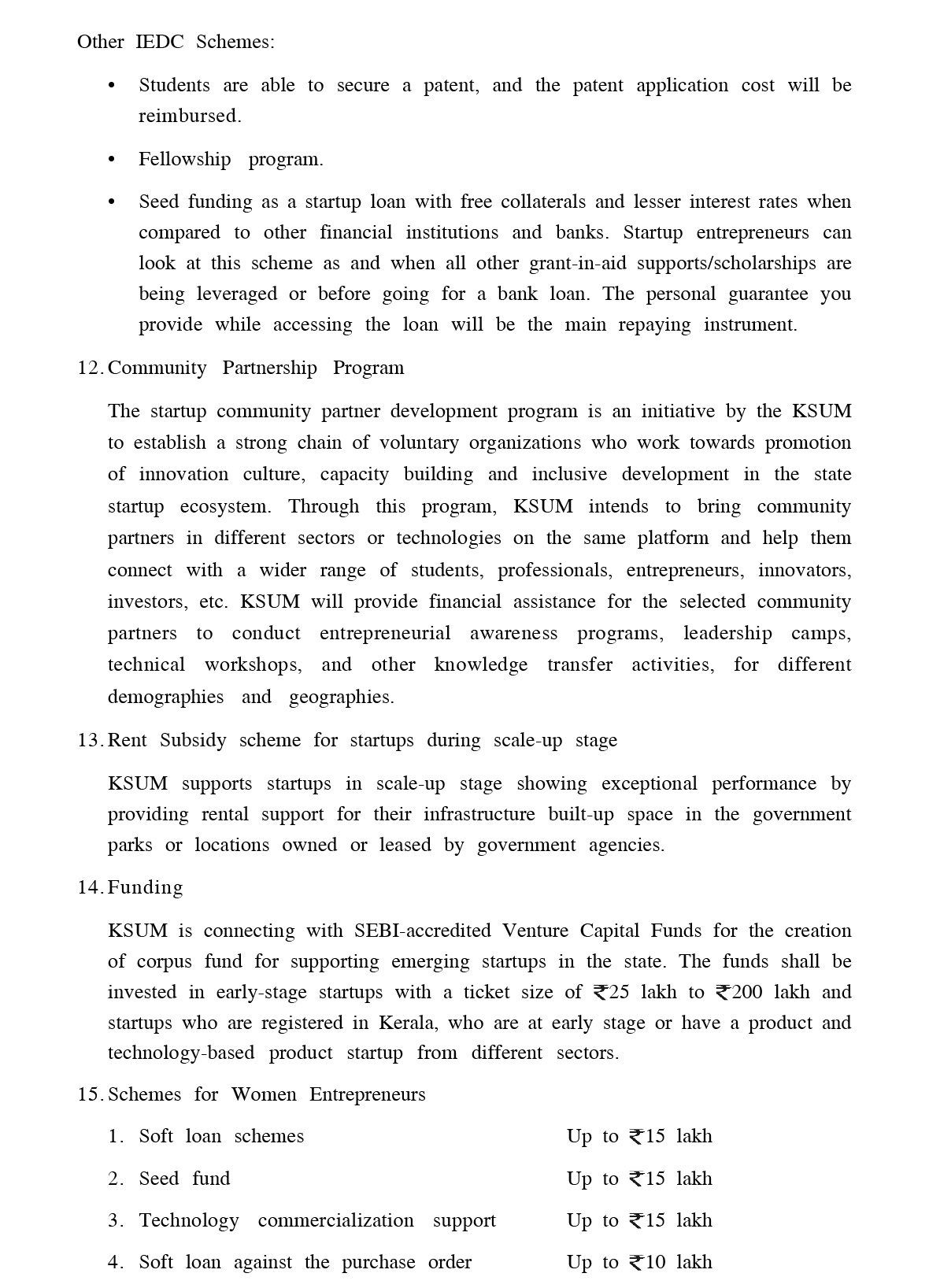
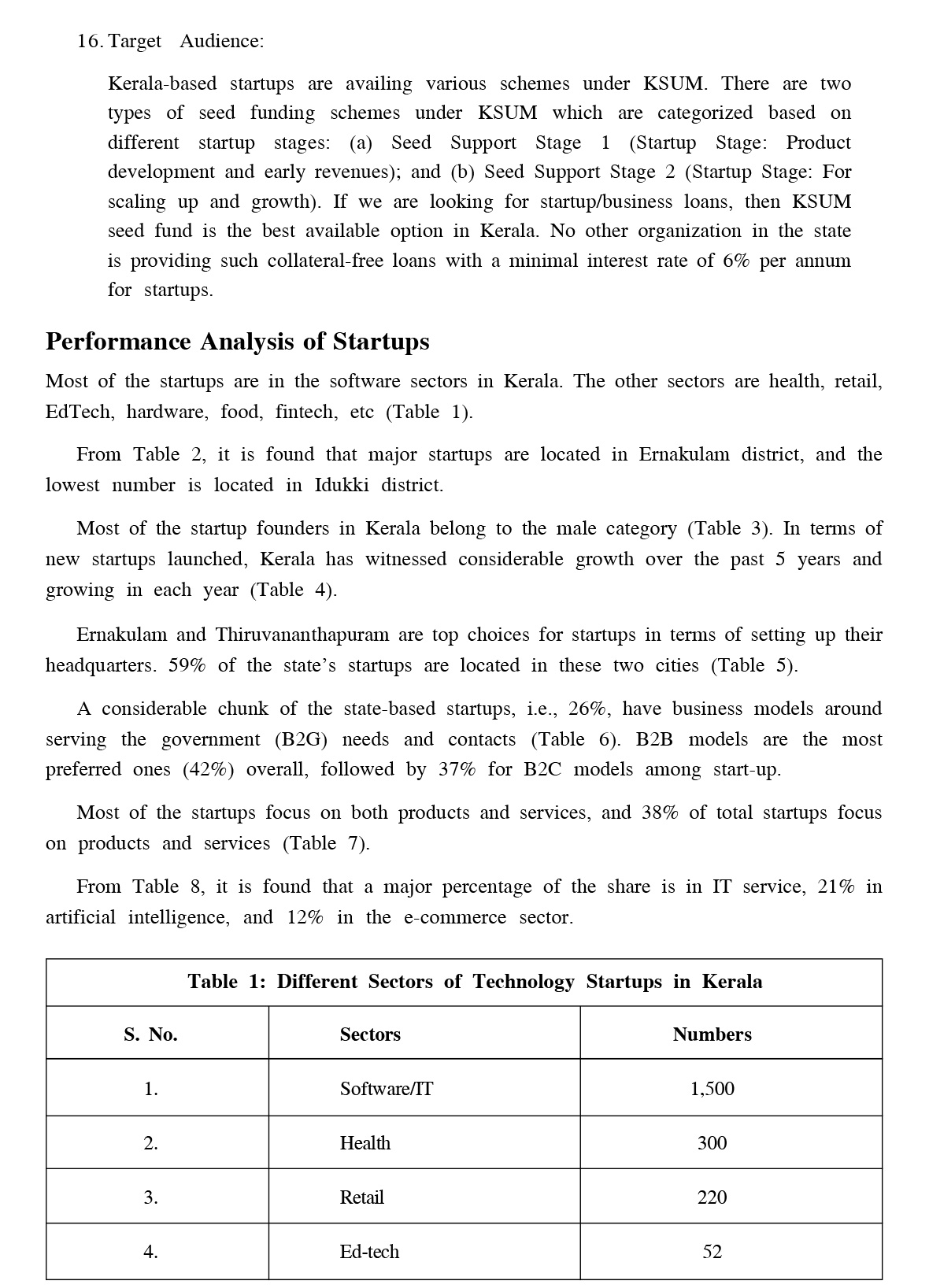
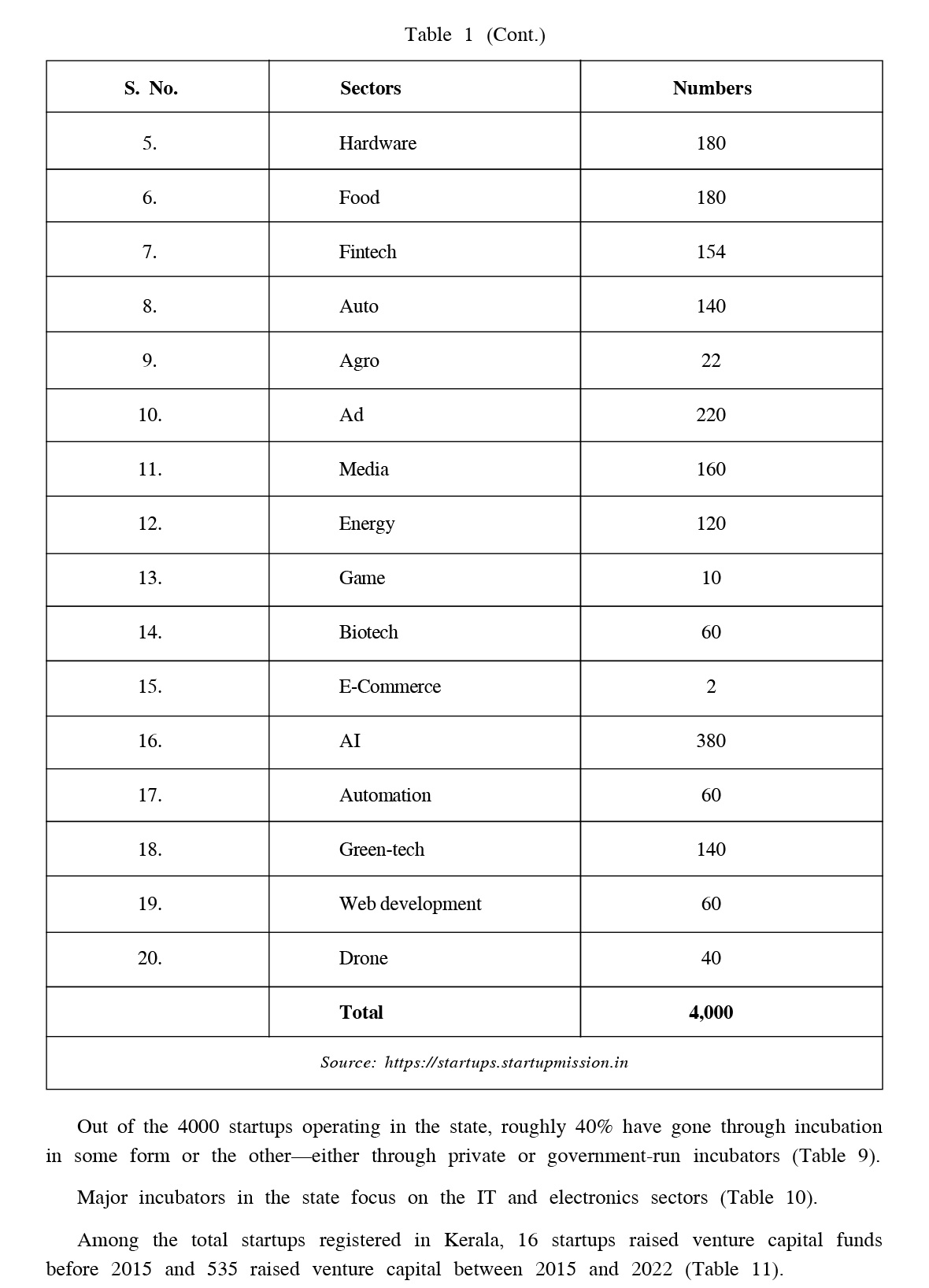
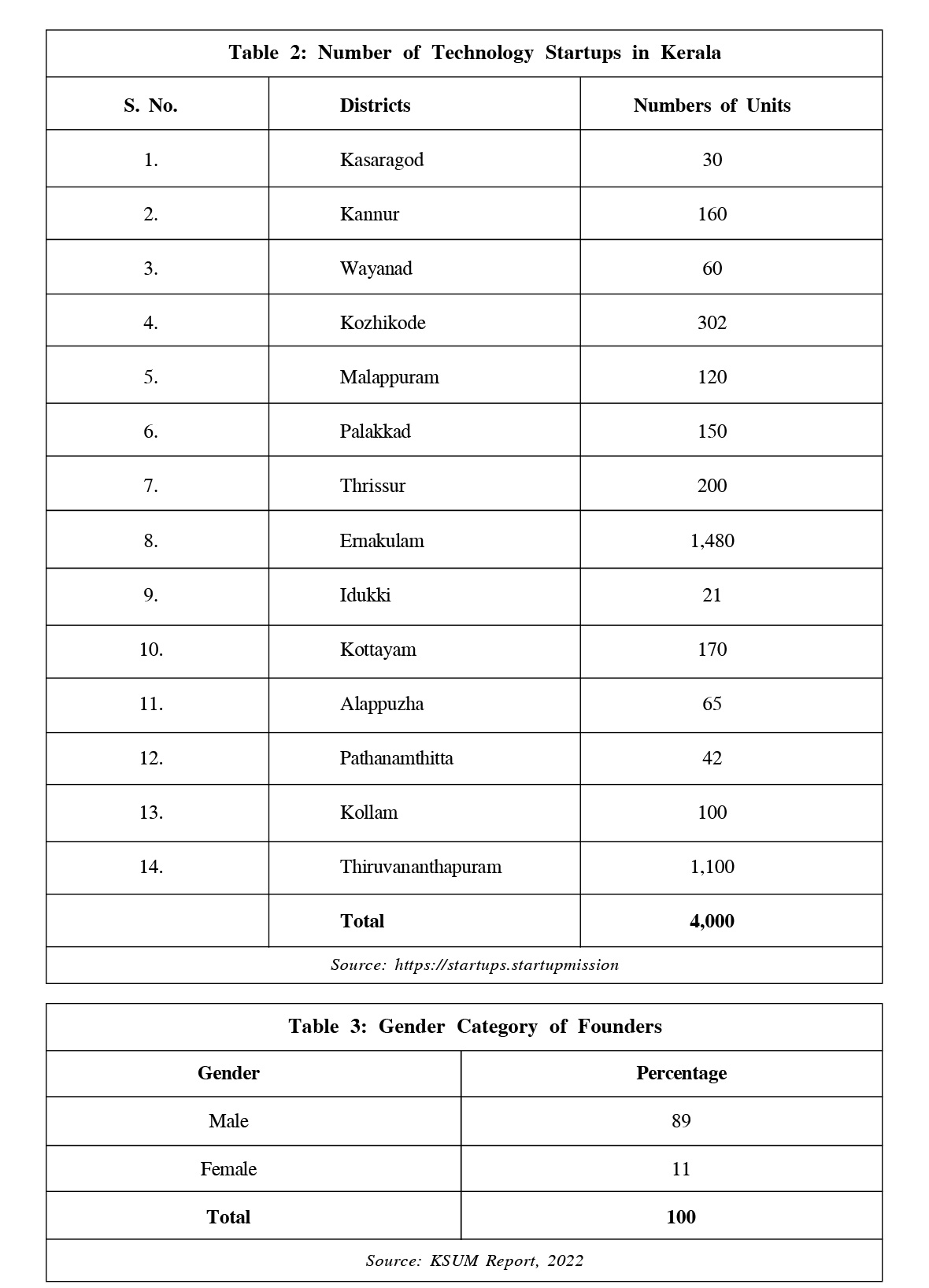
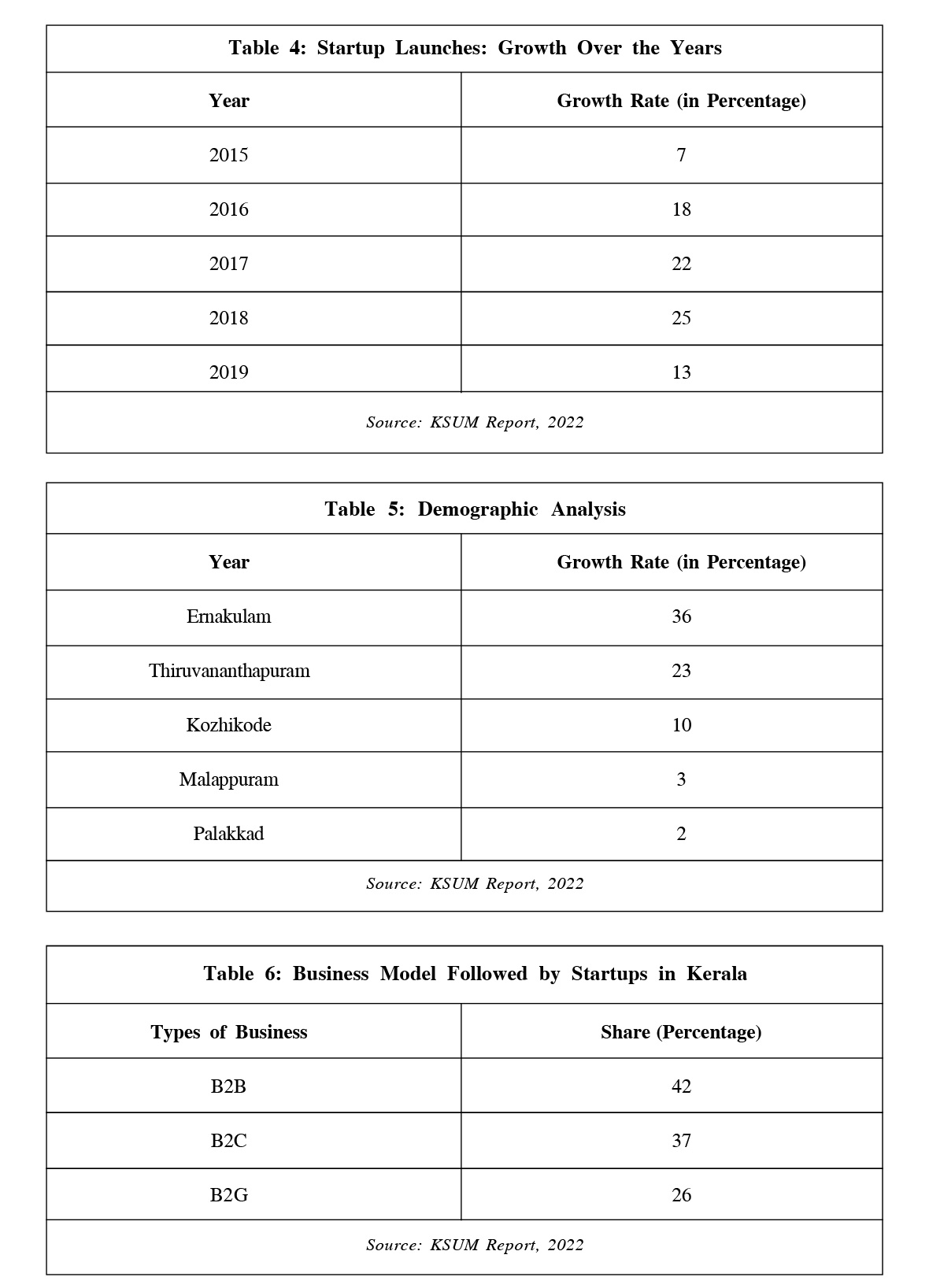
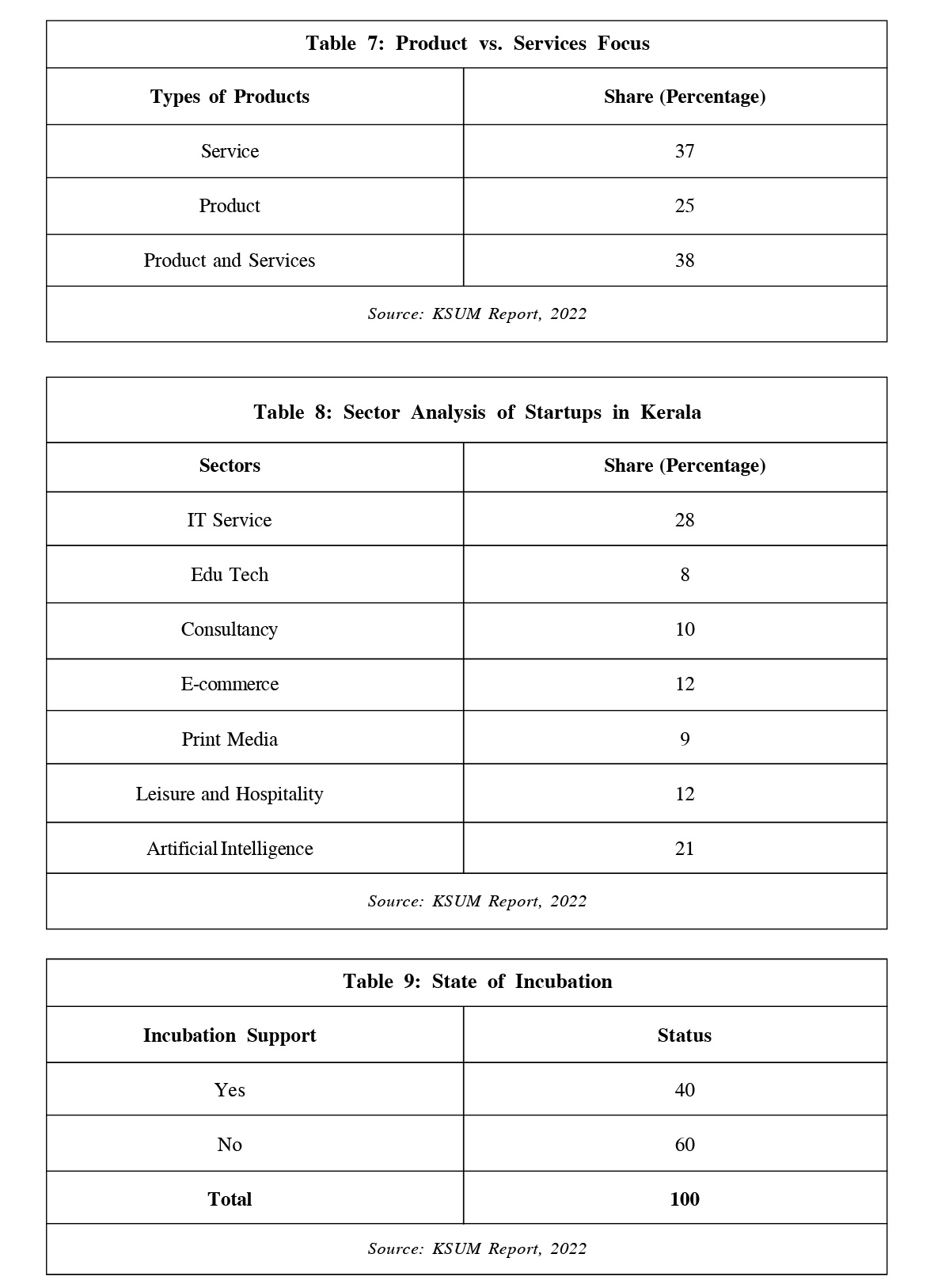
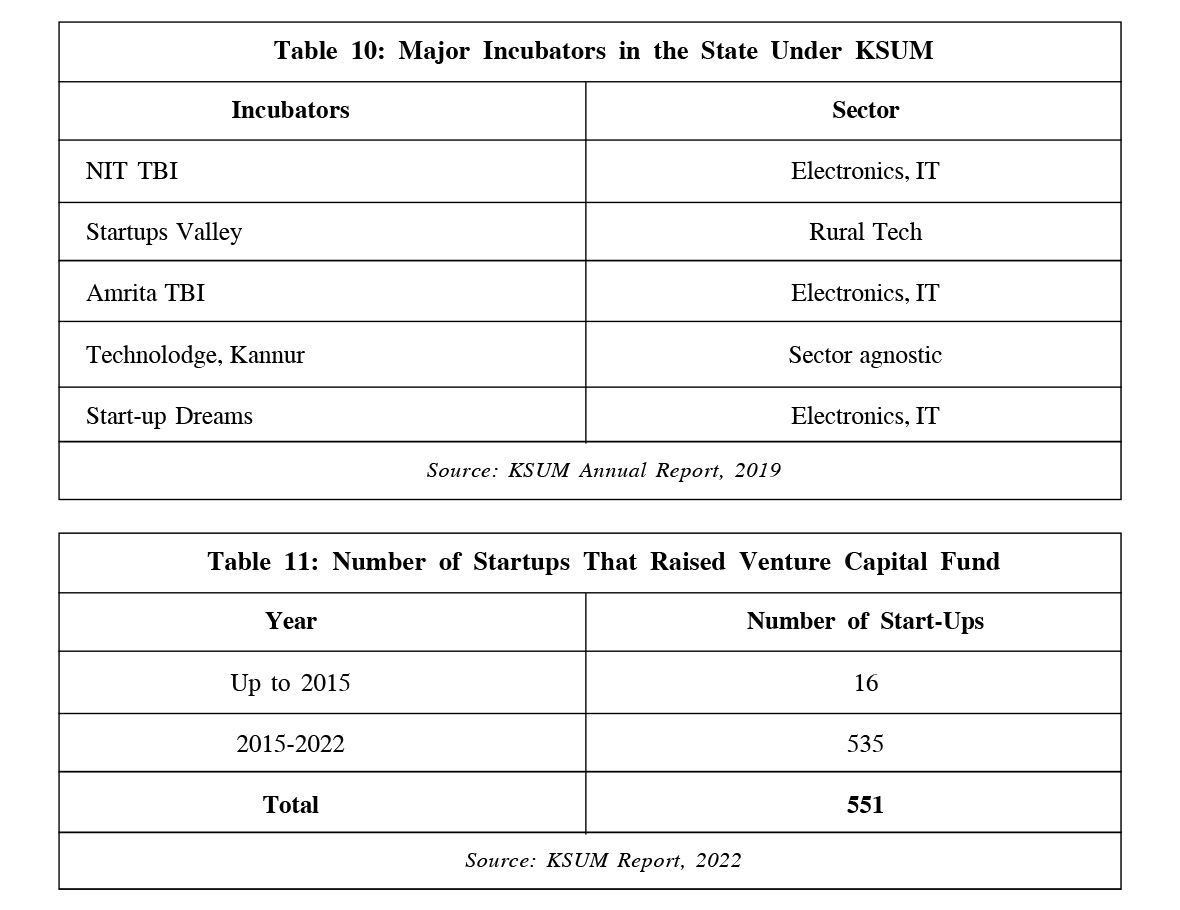
Conclusion
Promotion of startups remains the foundation stone for any sustainable startup ecosystem. Kerala has more than 375 Innovation Entrepreneurship development centers across colleges and universities and 63 incubators. These numbers reveal the presence of a vibrant ecosystem focused on support/enablement and funding.
KSUM focuses on technology-based and hardware startups. They provide ideas to develop innovative products using advanced technology solutions that can find fertile ground in KSUM. Most startups are found in the software sectors. Ernakulam district is found to be the top district in terms of startups. B2B business model is found to be the most preferred business model for startups in Kerala. Most startups focus on both product and services. While analyzing the sector-wise performance of startups, most are in the service sector. Only 40% of total startups have gone through incubation. Major incubators in the state focus on the IT sector and electronics. 535 startups raised venture capital between 2015 and 2022. KSUM is restricted to high-tech startups with technology products and innovations within a limited timeframe that literally makes the entrepreneur seriously work on their product. Based on the findings, we can conclude that KSUM has fulfilled its mission of discovering, supporting, nurturing, and establishing startups in the state, which have been able to come up with viable and scalable products.
References
- Audretsch D, Colombelli A, Grilli L et al. (2020), "Innovative Start-ups and Policy Initiatives", Research Policy, Vol. 49, No. 10, pp. 104027.
- Birley S (1996), "Start-up", Small Business and Entrepreneurship, pp. 20-39, Palgrave, London.
- Cassar G (2004), "The Financing of Business Start-ups", Journal of Business Venturing, Vol. 19, No. 2, pp. 261-283.
- Deepthi (2020), "A Study on Impact of Employee Engagement on Effectiveness of the Startup in Selected Start-ups in Bangalore City", International Journal of Advance and Innovative Research, Vol. 6, ISSN 2394-7399.
- Di Gregorio D and Shane S (2003), "Why do Some Universities Generate More Start-ups Than Others?", Research Policy, Vol. 32, No. 2, pp. 209-227.
- Gopaldas Pawan Kumar (2018), "Indian Start-ups - Issues, Challenges and Opportunities", National Conference at St Pious Institute of Management.
- Moondra R (2020), "A Cross Country Study of Start up Ecosystem with Respect to Business Incubation among India Canada USA", GLS University. Retrieved from http://hdl.handle.net/10603/312826
- Sabrina Korreck (2019),"The Indian Startup Ecosystem: Drivers, Challenges and Pillars of Support", ORF Occasional Paper No. 210, Observer Research Foundation.
- Sutton S M (2000), "The Role of Process in Software Start-up", IEEE Software, Vol. 17, No. 4, pp. 33-39.
- Trivedi H S (2020), "Best Incubation Practices An Analysis of Factors Affecting The Success Of The Business Incubators In India", GLS University. Retrieved from http://hdl.handle.net/10603/311230
- Witt P (2004), "Entrepreneurs' Networks and the Success of Start-ups", Entrepreneurship & Regional Development, Vol. 16, No. 5, pp. 391-412.
- Zaech S and Baldegger U (2017), "Leadership in Start-Ups", International Small Business Journal, Vol. 35, No. 2, pp. 157-177.
- https://startups.startupmission.in
- http://www.Keralastart-upmission
- http://techstory.in/start-up-India/
- KSUM Annual Reports 2017-2022